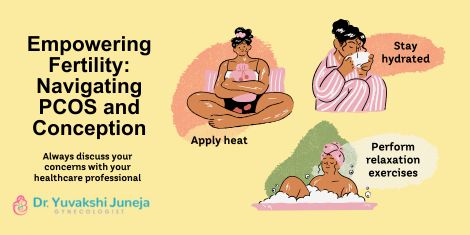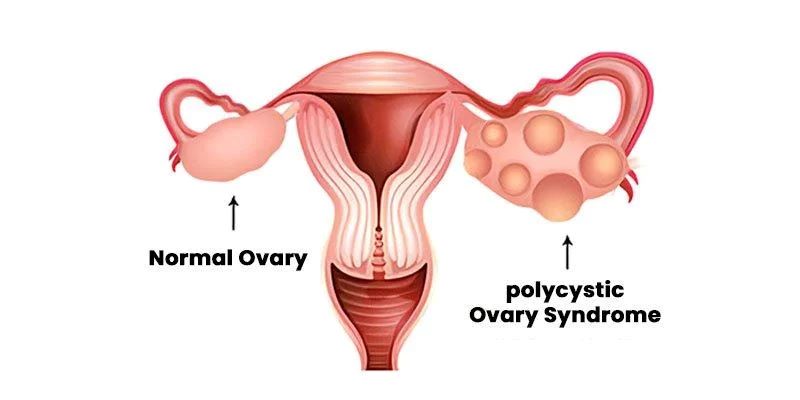PCOS and fertility: Navigating PCOS and Conception

The vast majority of women desire and expect to have children. However, women with chronic health issues such as polycystic ovary syndrome frequently have worries about childbearing, including whether or not they can become pregnant. Therefore, there is a need to understand the relation between PCOS and fertility for every women and the impact of Pcos on fertility.

PCOS is a prevalent hormonal condition that affects majorly women of reproductive age. One of the prominent considerations for women suffering from PCOD is the possible influence on fertility. In this blog, we will look at the association between PCOS and fertility, as well as the obstacles, treatment choices, and techniques for improving fertility in those with this disease.
Understanding the Relation between PCOS and Fertility
PCOS can cause the menstrual cycle of a woman to be disrupted, resulting in irregular periods and, in rare cases, the lack of ovulation. Ovulation is a critical step in conception because it occurs when an egg is released from the ovaries. The odds of spontaneously becoming pregnant are greatly lowered in the absence of ovulation.
Hormonal Imbalance’s Role
Hormonal abnormalities, notably higher levels of insulin and androgens (male hormones), are critical in the influence of PCOS on women fertility. Insulin resistance is frequently related to PCOS and can result in androgen overproduction, which interferes with proper ovulation and egg formation.
Strategies To Enhance Fertility
Lifestyle Changes: Adopting a healthy lifestyle can help PCOS-affected women become more fertile. It involves eating a well-balanced diet, exercising regularly, and controlling stress. A well-balanced diet can aid in the control of insulin levels and weight management, which in turn promotes hormonal balance and ovulation.
Weight Control: Many women with PCOS battle with their weight. Even little weight loss can enhance insulin sensitivity and hormonal balance, perhaps restoring ovulation and increasing fertility. If you face any difficulties, take recommendation from the best gynecologist in delhi, who can help you with the diet plans and weight management.
Medications: Fertility drugs, such as Clomiphene citrate, are frequently recommended to induce ovulation. These drugs can help control the menstrual cycle and increase fertility. Other drugs, such as Metformin, may be used to manage insulin resistance. It is advisable to first take consultation with your doctor before taking any kind of medicines.
Assisted Reproductive Techniques (ART): When spontaneous conception is problematic, assisted reproductive techniques such as in vitro fertilization (IVF) or intrauterine insemination (IUI) may be considered. These methods can help you prevent ovulation issues and increase your chances of becoming pregnant. Visit expert gynecologist for Assisted Reproductive Technique.
Ovulation Monitoring: Ovulation tracking tools like basal body temperature charting for ovulation prediction kits can assist women with PCOS in determining the ideal dates for conception. In any case of doubt visit your doctor for some suggestions and recommendations.
Consulting a Specialist: If you’re having trouble conceiving because of PCOD, you should see a reproductive endocrinologist or health care provider. They can provide customized advice and treatment alternatives based on your scenario.
Mix Therapy: In certain circumstances, the most successful method may be a mix of lifestyle modifications, drugs, and fertility treatments. Your healthcare practitioner can assist you in determining the best combination for your specific condition. Find experienced and compassionate gynecologists who can provide you with the care you need.
The Health of The Partner: Fertility is a shared experience. It is also critical to consider your partner’s health. Encourage them to live a healthy lifestyle and, if required, seek medical exams or health care.
Management of Expectations: While many women with PCOS can become pregnant, it is crucial to keep expectations in check. Infertility treatment can be time-consuming, and there may be setbacks along the way. Emotional support from loved ones and support groups can be invaluable at this time.
Maintaining Open Interaction: Maintaining open communication with your healthcare practitioner is crucial. Inform them of any changes, concerns, or questions. This partnership can help you fine-tune your reproductive strategy as required.
Long-Term Health: Even if fertility isn’t a concern right now, addressing PCOS is crucial for long-term health. Seek help from a Gynecologist Surgeon in Delhi because when treated appropriately, it can reduce the chance of developing other health problems such as type 2 diabetes and heart disease.
Tobacco and Alcohol: Both smoking and heavy alcohol intake might have a deleterious impact on fertility. Quitting smoking and minimizing alcohol use can help you conceive and have a healthy pregnancy.
Understanding PCOS Subtypes: PCOS is a condition that does not fit everyone. There are several kinds, each with its own set of symptoms and reproductive concerns. Understanding your exact subtype can aid in the development of the most effective treatment approach. To enhance accessibility, get to the best Gynecologist , offering a range of services from preventive care to specialized treatments.
Doctor’s Note On PCOS and Fertility
See what Dr. Yuvakshi Juneja has to share -While PCOS can make conception difficult, it’s essential to note that with the correct techniques and medical care, many women with this illness can successfully conceive. Women can take proactive efforts toward realizing their ambition of beginning a family by recognizing the association between PCOS and fertility, adopting lifestyle changes, and seeking appropriate medical assistance. If you’re worried about your fertility or PCOD, speak with a healthcare expert who can offer advice and assistance tailored to your specific circumstances.
